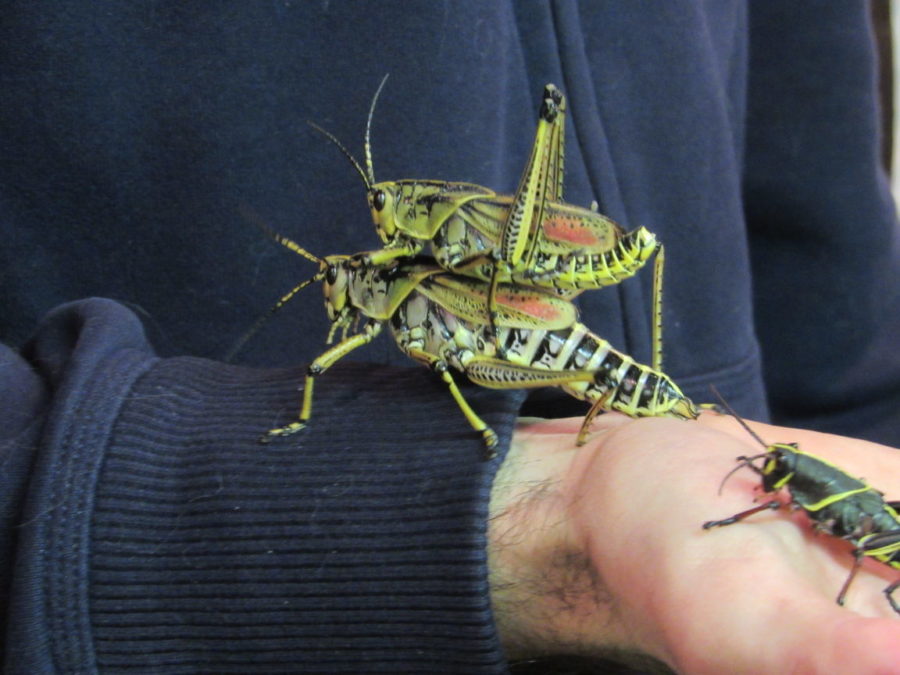Insect Fear Film Festival celebrates bugging out
February 26, 2015
Even May Berenbaum, National Medal of Science winner and entomology professor, once feared insects.
They creep, they crawl, they slither. And for every one human on Earth, there are 200 million insects.
But now, it’s time to face them.
Insect phobias will be explored — and possibly broken — Saturday at 6 p.m., as the Department of Entomology hosts the Insect Fear Film Festival at Foellinger Auditorium for its 32nd year. The festival will show insect fear films and feature other activities, summoning interactions between attendees and insects. “The X-Files Fight For the Future,” “Wasp Woman” and “Men In Black” are just some of the notable films that have been featured at the festival in the past.
The three-decade-long festival was originally just an idea that hatched when Berenbaum was a graduate student at Cornell University.
Get The Daily Illini in your inbox!
“I was walking on campus when I saw a sign that the Asian-American Student Association was showing ‘Godzilla,’” Berenbaum said. “If the Asian-Americans can have a sense of humor about their film identity, why can’t entomologists?”
Berenbaum established a serious reputation before pitching the comical idea to her department at the University. But by 1984, it became a reality.
“They loved it,” Berenbaum said with a laugh.
Now, the festival has sprouted and spread to institutions and communities across the world.
“As far as I can tell, we were the first to have a public event associated with interaction with insects. Now it’s everywhere — even overseas,” Berenbaum said. “Iowa State (University) started an Insect Film Festival. Some of our alumni have gone out and started Insect Fear Film Festivals at their home institutions.”
The inspiration for this year’s theme is Female Entomologists, which Berenbaum said was inspired by a trend she has noticed over the past 30 years.
“In a lot of our outreach events, it’s the girls who are the ones to handle the insects first,” Berenbaum said. “It’s the guys who look dubious over the whole thing.”
The event isn’t just an opportunity for attendees to view films. They can let a tarantula crawl up their sleeve at the insect petting zoo or observe every antennae and spike on an electron microscope.
“I think it’s really good to expose the general public to insects other than stepping on them or killing them at their house,” said Aron Katz, president of the Entomology Graduate Student Association and graduate student in LAS. “Somehow, when you turn from a kid to an adult, many people just develop this disgust for insects.”
According to Berenbaum, the festival is the University’s version of “Fear Factor.”
“People are inclined to believe the worst about insects,” she said. “That’s why there are so many movies about dangerous, evil insects. Face your fears; knowledge is power. They’re after good, not after you.”
In fact, insect horror films have been dominating Hollywood screenplays since the 1950s, where bus-sized ants destroy cities and massive locusts eat people alive.
But when it comes to the insect petting zoo, Berenbaum said she believes the real stars are far more spectacular than any mutant, Hollywood-conjured arthropod.
“To see what nature has come up with is jaw-dropping,” she said. “(There are) these enormous ants from Argentina called Dinoponera that are huge — up to one-and-a-half inches long. Not as big as a Greyhound bus, but still, they’re pretty impressive.”
To Mari Shigeta, junior in LAS and a frequent event attendee, that’s exactly what the insect petting zoo is.
“They’re kind of beautiful,” Shigeta said. “You get to hold these insects that you would not have an opportunity to outside, and I personally really like that. In a way, I think (it makes) people less afraid. Obviously, I couldn’t be a little bit scared at the thought of it biting me, but it was very calm and friendly.”
Once people start to realize just how important and safe insects usually are, Berenbaum said the festival will fulfill its true purpose.
“They run the world. We couldn’t live without insects. They’re the major garbage processes and pollinators. The vast majority are good for humans,” she said. “There are dangerous insects, but they’re typically not the insects people are afraid of. People aren’t terrified of mosquitoes, but there are good reasons to be afraid of them because they carry all kinds of diseases for which there are no treatments.”
Until then, she said she believes Hollywood will continue taking over the world, producing movies featuring giant tarantulas and mosquitoes.
“We will never run out of movies,” she said. “This is too entrenched.”
But as Hollywood grows, the festival is much more than the movies for Berenbaum.
It’s where she met her husband, Richard.
It’s where she examined exotic insects from all around the world.
Simply put, the Insect Fear Film Festival has become an important part of her life.
“The first year we called it the first annual, and I had no idea we would even do a second one. We’ve been doing this so long, I’ve watched kids grow up and bring their kids to the festival, too,” Berenbaum said. “It changed my life literally when my department head said ‘go ahead.’”







